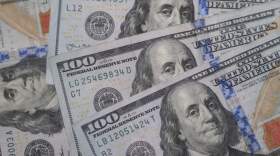NOEL KING, HOST:
There is a big question on the minds of economy watchers. Will the Federal Reserve raise interest rates again? Fed Chairman Jay Powell is expected to make an announcement soon. President Trump has been really clear that he opposes a rate hike. David Wessel is director of the Hutchins Center at the Brookings Institution. He's with us now. Good morning, David.
DAVID WESSEL: Good morning.
KING: All right. Before we get into the economic weeds, just remind us, how do interest rate hikes affect regular people?
WESSEL: Right. Well, the Fed has raised interest rates six times over the past couple of years by a percentage point and a half. And there's a direct link from what the Fed does to what the rates that consumers pay when they borrow on auto loans and credit cards - they've gone up - and on the rates that savers get on money market funds and certificates of deposit.
Actually, mortgage rates are also sensitive to what the Fed does, but in a kind of different way. Mortgage rates are largely set by the bond market. And because mortgage - because the bond market now anticipates the Fed's going to be a little less aggressive about raising interest rates, mortgage rates were shot up. They've actually come down a bit in the last couple of weeks.
KING: Oh, that's interesting. I mean, look, it's been a shaky time for the economy. The stock market's been sliding around. The housing market is softening. Businesses are nervous about trade uncertainties. Why is the Fed considering raising rates again?
WESSEL: Well, all the things you mentioned are definitely part of the calculus. But the Fed looks at the economy. It's been growing pretty strongly. Unemployment's at a 50-year low. Inflation is near its 2 percent target. So the Fed figures it's time to pull its foot off the accelerator because it wants to avoid the economy overheating and get too much inflation.
KING: Let me ask you - we've seen some ups and downs in the stock market lately. How much does the market factor into the Fed's decision?
WESSEL: It does factor into the Fed's decision. Look, the falling stock market and financial conditions more generally, like the rates that businesses pay when they borrow in the bond market, act like a brake on the economy. People who own stocks tend to spend a little less. People borrow a little less. Businesses invest a little less. And as you suggest, there's been a general lack - weakening of confidence in the economy when you see these headlines about 500 points on the stock market.
So what the Fed says is we focus on the economy, not the stock market per se. But this tightening of financial conditions - that's the Fed jargon for this - is like a substitute for interest rates. It has the same effect on the economy. The markets are putting a little break on the economy.
So in light of that and all the other uncertainty in the economy - the trade war slowing of the rest of the world - the Fed today is probably going to change its wording. They're going to stop talking about further gradual increases in its key interest rate and instead talk about how the pace of future interest rate increases next year depends a lot on what the economy says. Here's how Fed Chairman Jay Powell put it in a recent speech.
(SOUNDBITE OF ARCHIVED RECORDING)
JAY POWELL: I liken it to walking into a room full of furniture like this, and suddenly the lights go out. So what do you do? You slow down. And you maybe go a little bit less quickly and you feel your way more.
KING: David, just very quickly - do you think the Fed could be swayed by the president's urging it not to raise rates?
WESSEL: I think there's a case that the Fed could hold off on the rate increase now. If they're swayed by the president, it's in a kind of perverse way. If it's a close call, the Fed may be reluctant to hold off on raising interest rates because they don't want to appear to be giving in to the president. Because if the markets think the president is setting interest rates, that could really disrupt things and make the markets respond even more negatively than they would to a rate increase itself.
KING: Some interesting psychology at play there. David Wessel is the director of the Hutchins Center at the Brookings Institution. He also contributes to The Wall Street Journal. Thanks.
WESSEL: You're welcome. Transcript provided by NPR, Copyright NPR.
NPR transcripts are created on a rush deadline by an NPR contractor. This text may not be in its final form and may be updated or revised in the future. Accuracy and availability may vary. The authoritative record of NPR’s programming is the audio record.






